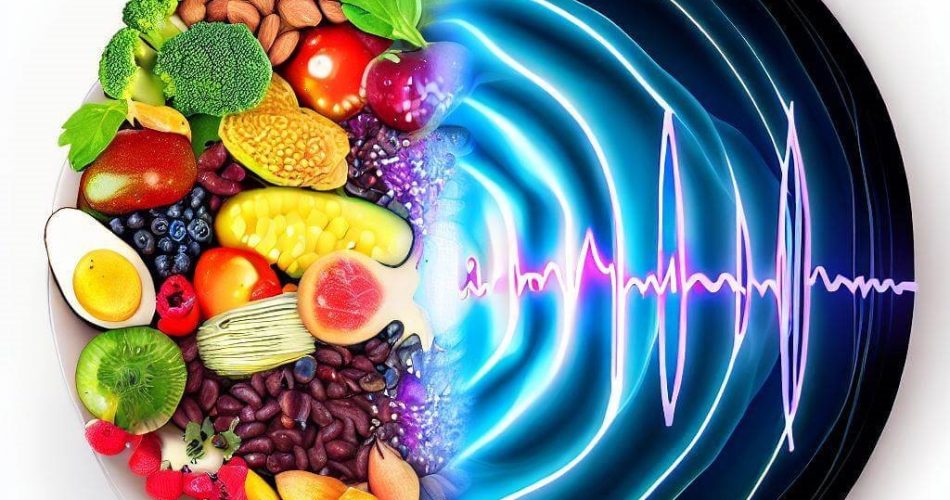In an increasingly digital world, concerns about electromagnetic fields (EMFs) and their potential health implications are more relevant than ever. As the conversations around EMF protection evolve, a new angle has entered the spotlight—nutrition. Could what you eat make a difference in how your body handles EMF exposure? This article delves into this complex topic, offering a balanced view and practical advice.
Understanding EMF: What It Is and Why It’s Important
Electromagnetic fields (EMFs) are an integral part of the modern world. They are invisible areas of energy, often referred to as radiation, that are generated by electrical devices, power lines, and even the Earth itself.
What Exactly Is EMF?
EMF stands for “Electromagnetic Field,” a field of force that consists of both electric and magnetic components. EMFs result from the motion of electric charges and can vary in frequency from low to high, including ranges like radio frequencies (RF), microwaves, and even ionizing radiation such as X-rays.
Sources of EMF
EMF sources are diverse and a part of everyday life. Here are some common sources:
- Mobile Phones: These are perhaps the most ubiquitous sources of EMF today.
- Laptops and Tablets: These devices not only emit EMF themselves but also are often used in conjunction with Wi-Fi, adding another layer of EMF.
- Wi-Fi Routers: A household necessity in today’s world, these too emit EMFs.
Health Implications
Now, you might be wondering, “So what? Why should I care?” Well, numerous scientific studies have delved into the potential health implications of EMF. According to the World Health Organization (WHO), low-level exposure to EMF is generally considered safe. However, prolonged exposure to high levels of EMF may have health effects.
Some of these health implications could include:
- Sleep Disturbances: Exposure to high levels of EMF has been linked to sleep problems in some studies.
- Headaches and Fatigue: Some individuals report these symptoms upon extended exposure to EMF.
- Cancer: While not definitively proven, some types of EMF exposure have been classified as possibly carcinogenic by the International Agency for Research on Cancer (IARC).
The Growing Concerns About EMF Exposure
As EMFs have become a constant presence in our lives, so too have the concerns surrounding their potential health impacts. It’s no longer a topic confined to the fringes of scientific inquiry; it’s a subject of global discussion.
Popular Beliefs About EMF Exposure
- Chronic Illnesses: A segment of the population firmly believes that EMF exposure could lead to chronic diseases, such as cancer and neurodegenerative conditions.
- EMF-Free Zones: Some advocate for spaces that are completely free of EMF, especially in places like schools or hospitals.
“To some, an EMF-free zone might sound like a utopia. But is it practical in our increasingly connected world?”
Scientific Viewpoints on EMF
The scientific community takes a more cautious approach. According to the National Institute of Environmental Health Sciences, while there is some evidence of biological effects at low levels of EMF exposure, these effects haven’t been clearly demonstrated to be harmful to humans.
Insufficient Evidence, but Don’t Ignore
The prevailing scientific viewpoint is that there is insufficient evidence to conclusively say that EMF exposure is harmful. However, this does not mean it should be ignored. Ongoing research aims to provide clearer answers.
Caution Is Warranted
Many scientists advocate a cautionary approach, given that our understanding of EMF’s long-term effects is still evolving. Some countries like Switzerland have even adopted precautionary measures, setting lower exposure limits for high-frequency emissions from base stations.
By examining both the popular beliefs and scientific viewpoints, it becomes clear that the conversation around EMF exposure is not black and white. While extreme beliefs may lack substantial scientific backing, dismissing the potential risks outright may also be premature. Therefore, a balanced, research-based approach is crucial in understanding and mitigating the potential health effects of EMF exposure.

Can Nutrition Help Mitigate EMF Exposure?
The role of nutrition in mitigating the effects of EMF exposure is an emerging area of interest. While the topic is still in its infancy, preliminary studies and research suggest that certain nutrients could offer a level of protection against the biological effects of EMF. Before diving into specific nutrients, it’s essential to understand the scientific premise behind this idea.
The Biological Mechanisms
EMF exposure has been shown to generate oxidative stress in cells, which can lead to a variety of health issues ranging from inflammation to cellular damage. This is where nutrition comes into play. Certain nutrients possess properties that can combat oxidative stress and inflammation, offering a potentially effective way to mitigate the effects of EMF.
Antioxidants: The First Line of Defense
Antioxidants serve as a “bodyguard” for your cells. They neutralize free radicals—unstable atoms that can damage cells and contribute to aging and diseases. Free radicals are often increased due to stressors like EMF exposure, making antioxidants a key line of defense.
Why Are Antioxidants Effective?
Antioxidants are molecules that can donate an electron to free radicals without becoming destabilized themselves. This effectively neutralizes the free radical and prevents it from causing further cellular damage. A study published in the Journal of Radiation Research and Applied Sciences found that antioxidants could counter the oxidative stress induced by exposure to radiofrequency radiation, a form of EMF.
Foods Rich in Antioxidants
If you’re keen on reducing the potential risks of EMF exposure, incorporating antioxidant-rich foods into your diet is a straightforward place to start. Here are some top contenders:
- Berries: Blueberries, raspberries, and strawberries are potent sources of antioxidants like vitamin C and flavonoids.
- Nuts and Seeds: Almonds, walnuts, and chia seeds are high in vitamin E, another powerful antioxidant.
- Green Tea: Loaded with catechins, green tea is another excellent source of antioxidants.
Antioxidant Supplements
For those who find it difficult to get enough antioxidants through food alone, supplements are an option. Some commonly used antioxidant supplements include:
- Vitamin C: An easily available supplement known for its antioxidant properties.
- Vitamin E: Often used in conjunction with vitamin C to enhance its effects.
Note: Always consult a healthcare professional before adding new supplements to your diet.

Expert Opinions
Dr. Andrew Weil, a renowned doctor and natural health proponent, suggests that while antioxidants can’t offer full protection against EMF exposure, they can certainly be part of an integrative approach to managing its risks.
By incorporating antioxidants into your diet, either through foods or supplements, you could potentially create a first line of defense against the oxidative stress induced by EMF exposure. However, this should not be considered a standalone solution but rather a part of a broader strategy for mitigating the effects of EMF.
Omega-3 Fatty Acids: Beyond Brain Health
Omega-3 fatty acids are widely known for their benefits in promoting brain health, reducing inflammation, and enhancing cardiovascular well-being. However, recent explorations indicate that these essential fatty acids could have a role to play in mitigating the effects of EMF exposure as well.
How Do Omega-3 Fatty Acids Help?
Omega-3 fatty acids are key players in reducing inflammation in the body. Since EMF exposure has been linked to increased cellular inflammation and oxidative stress, omega-3s could theoretically mitigate some of these effects. A study published in the Environmental Health and Preventive Medicine journal suggests that omega-3s can act as neuroprotective agents against EMF-induced oxidative stress in the brain.
Sources of Omega-3 Fatty Acids
Getting more omega-3s into your diet is not particularly challenging. Here are some excellent sources:
- Fish: Salmon, mackerel, and sardines are among the best sources.
- Plant-Based: Flaxseeds, walnuts, and chia seeds offer a plant-based omega-3 option.
- Supplements: Fish oil or algal oil supplements can be a convenient way to increase your omega-3 intake.
Note: As with any supplement, it’s essential to consult healthcare providers for personalized advice.
Dosage and Considerations
While there isn’t a universally agreed-upon dosage for omega-3s to counteract EMF exposure, general guidelines for adults suggest an intake of around 250–500 mg combined EPA and DHA, the most effective forms of omega-3, per day for general health benefits.

Minerals That Matter
Minerals are often the unsung heroes when it comes to nutrition and health. Some essential minerals have been indicated in research to provide protective effects against the harmful outcomes of EMF exposure.
Magnesium: The Multi-Tasker
Magnesium is crucial for hundreds of biochemical reactions in the body, and it also has antioxidant properties. Some preliminary research has suggested that magnesium can protect cells from the oxidative stress caused by EMF exposure. In a study published in the Journal of the American College of Nutrition, magnesium was found to improve the antioxidant capacity of the vascular endothelial lining, which can be compromised due to EMF exposure.
Zinc: The Immunity Booster
Zinc is vital for immune function and cellular repair. It also acts as an antioxidant and has been shown to counteract oxidative stress, thus suggesting a possible protective role against EMF-induced damage.
Sources of Essential Minerals
These minerals can be incorporated into your diet through various foods:
- Magnesium: Found in nuts, seeds, and green leafy vegetables like spinach.
- Zinc: Commonly found in meat, dairy, nuts, and legumes.
Supplements: A Helping Hand
For those who have difficulty meeting their mineral needs through diet alone, supplements can provide an additional source. However, like all supplements, these should be taken under the guidance of a healthcare provider.
By including omega-3 fatty acids and essential minerals in your diet, you can add an extra layer of defense against the potential adverse effects of EMF exposure. Yet, it’s crucial to note that nutrition should be part of a comprehensive approach to manage EMF risks, not a standalone solution. Always consult a healthcare provider for personalized advice tailored to your specific needs.
Pros and Cons of Using Nutrition to Combat EMF
Using nutrition as a tool to mitigate the effects of EMF exposure is an area that has seen increasing interest in recent years. However, like all health-related strategies, this approach comes with its own set of advantages and disadvantages. Below, we delve into the pros and cons of utilizing nutrition to combat EMF.
Pros of Using Nutrition to Mitigate EMF Exposure
Natural Defense Mechanisms
Nutrition offers a natural way to fortify the body’s innate defense mechanisms. Antioxidants and minerals can help combat the oxidative stress often associated with EMF exposure, as shown by research published in the Journal of Radiation Research and Applied Sciences.
Holistic Health Benefits
The nutrients that combat EMF effects are often the same ones that contribute to overall health and well-being. For example, omega-3 fatty acids, apart from potentially mitigating EMF effects, are also good for heart health.
Affordability and Accessibility
Nutrients that can help protect against EMF are often found in everyday foods like berries, nuts, and fish, making it easier and more cost-effective to incorporate them into your diet compared to specialized EMF protection gadgets.
Cons of Using Nutrition to Mitigate EMF Exposure
Insufficient Research
The most significant downside is the lack of comprehensive research proving that nutrition can effectively counteract EMF exposure. The studies that do exist are preliminary and often inconclusive.
Not a Standalone Solution
Even if nutrition does offer some level of protection, it is unlikely to be a standalone solution for EMF exposure, which can come from various sources and may have different kinds of effects on the body.
Potential for Overconsumption
The quest to combat EMF through nutrition might lead some people to overconsume certain nutrients, which could have its own set of health risks.
Practical Tips for Incorporating EMF-Fighting Nutrients
Navigating the myriad of nutritional advice can be daunting, especially when trying to focus on EMF protection. However, some practical tips can help you make more informed choices.
Diversify Your Diet
A diverse diet rich in fruits, vegetables, nuts, and lean protein ensures you get a broad range of antioxidants and minerals. The broader your intake of these nutrients, the better your overall defense mechanisms.
Prioritize Quality Over Quantity
Instead of focusing solely on antioxidant-rich foods, look for foods that offer a range of nutrients. For example, salmon provides not only omega-3 fatty acids but also high-quality protein and vitamin D.
Don’t Forget Hydration
A well-hydrated body functions more efficiently and may better cope with potential stressors, including EMF. Water itself is a universal solvent that helps flush toxins out of the body.
Consult Professionals for Personalized Advice
For tailored advice, consult a registered dietitian or a healthcare provider who can provide insights into how you can modify your diet to include more EMF-fighting nutrients.
Note: Always ensure you consult healthcare providers before making significant changes to your diet, especially if you have existing health conditions or are pregnant.
Incorporating EMF-fighting nutrients into your diet is a proactive approach that could offer some level of protection against the potential risks of EMF exposure. However, this should be seen as one piece of a broader EMF protection strategy, rather than a cure-all
Other Ways to Protect Against EMF
While nutrition offers a promising line of defense against EMF exposure, it’s essential to consider other methods that can be employed for comprehensive protection.
Distance is Your Friend
One of the most effective ways to minimize EMF exposure is to maintain a safe distance from the source of the electromagnetic fields. The strength of these fields decreases exponentially with distance, making it a viable mitigation strategy.
Limit Screen Time
Excessive screen time, especially on devices that are connected to Wi-Fi or cellular networks, increases your exposure to EMF. Implementing no-screen zones in the house, such as the dining room and bedrooms, can help minimize this risk.
EMF Shielding Products
There are various products designed to shield against EMF, ranging from clothing to device-specific shields. However, the effectiveness of these products can vary, and they can be expensive.
Be Mindful of Your Environment
EMF exposure can also come from unlikely sources, such as electrical wiring in old buildings or even certain electrical appliances. Being aware of your environment and potentially having it tested for EMF can provide additional safety measures.
Expert Opinions
Renowned health experts offer their insights into how to navigate the complex relationship between EMF and nutrition:
Dr. Mercola’s Views
Dr. Joseph Mercola, a prominent wellness advocate, emphasizes the importance of a holistic approach. He suggests that while nutrition can offer some benefits, it should be combined with lifestyle changes, like reducing screen time and being mindful of your surroundings.
The BioInitiative Report
The BioInitiative Report, a comprehensive review of existing studies on the health effects of EMF, advocates for caution and suggests implementing multiple layers of protection, including nutrition, to minimize risks.
Conclusion: Navigating the Complex World of EMF and Nutrition
Protecting yourself from the potential risks associated with EMF exposure is not straightforward. It’s a complex field with constantly evolving research. Nutrition offers an avenue for defense against these potential risks but should not be seen as a standalone solution. Instead, it should be part of a multi-faceted approach to minimizing EMF exposure, which could include lifestyle changes, usage of protective products, and increased awareness of your environment. As the research advances, a more clear understanding of how nutrition and other protective measures interact with EMF exposure will hopefully emerge.
FAQs
1. Can nutrition completely protect me from EMF exposure?
No, while certain nutrients can help mitigate the effects of EMF, they should not be considered a complete solution.
2. Are EMF shielding products effective?
The effectiveness of EMF shielding products varies. It’s important to research and consult experts before relying solely on these products for protection.
3. What foods are rich in antioxidants?
Berries, nuts, seeds, and green vegetables are excellent sources of antioxidants.
4. What other lifestyle changes can help in reducing EMF exposure?
Limiting screen time, maintaining distance from EMF sources, and being aware of your environment can contribute to reduced EMF exposure.
5. Are there any side effects to consuming antioxidant supplements?
While antioxidants are generally considered safe, excessive consumption can have adverse effects. Always consult a healthcare provider before starting any new supplement regimen.

